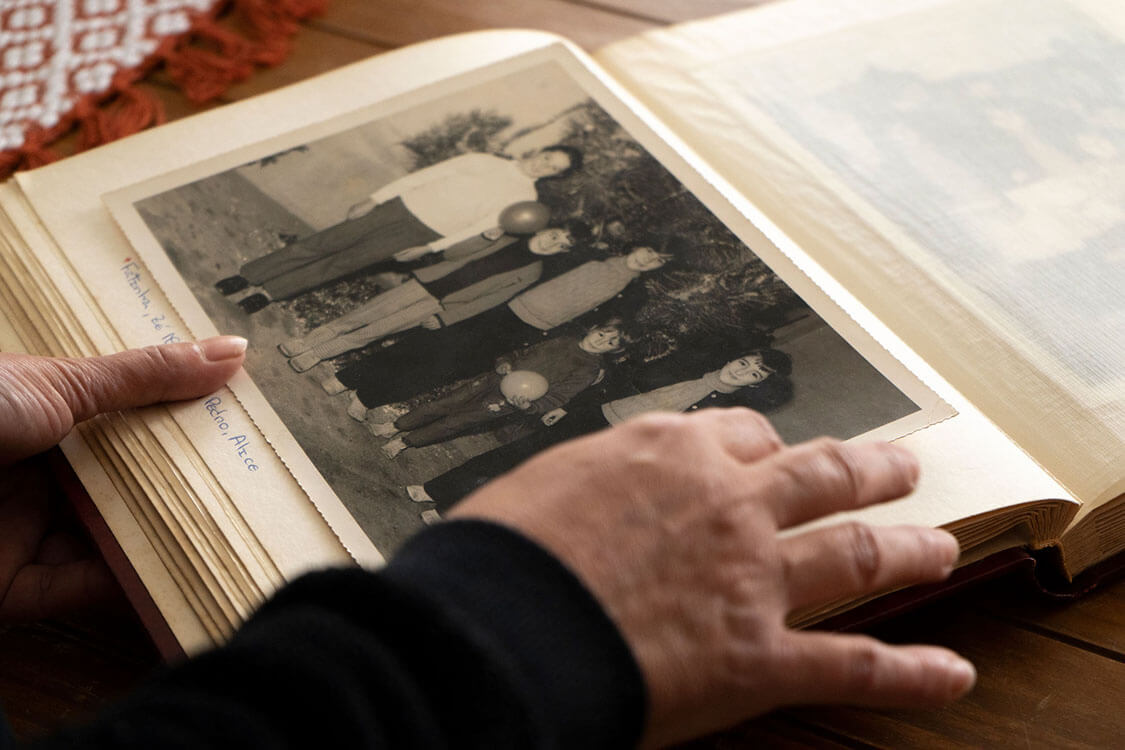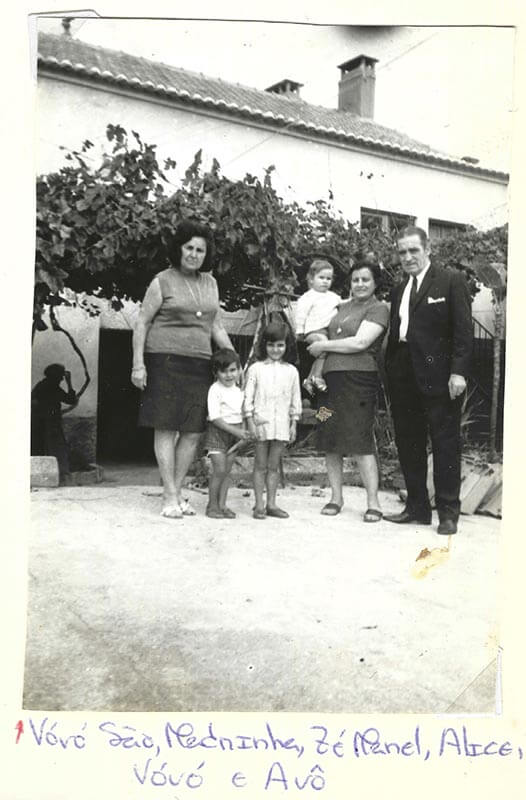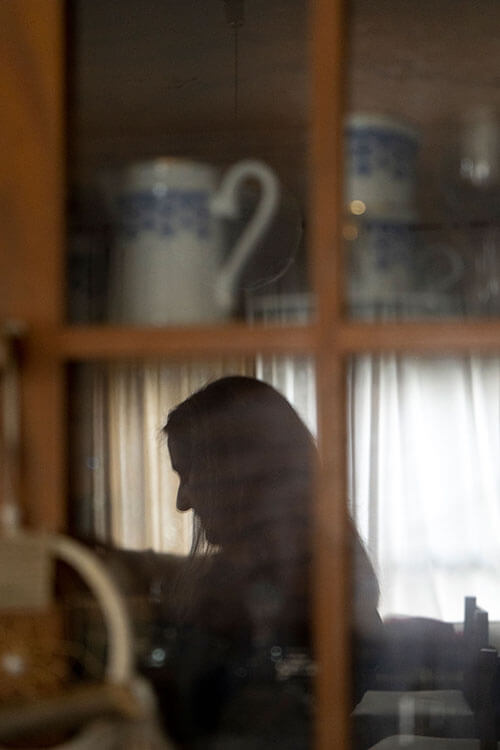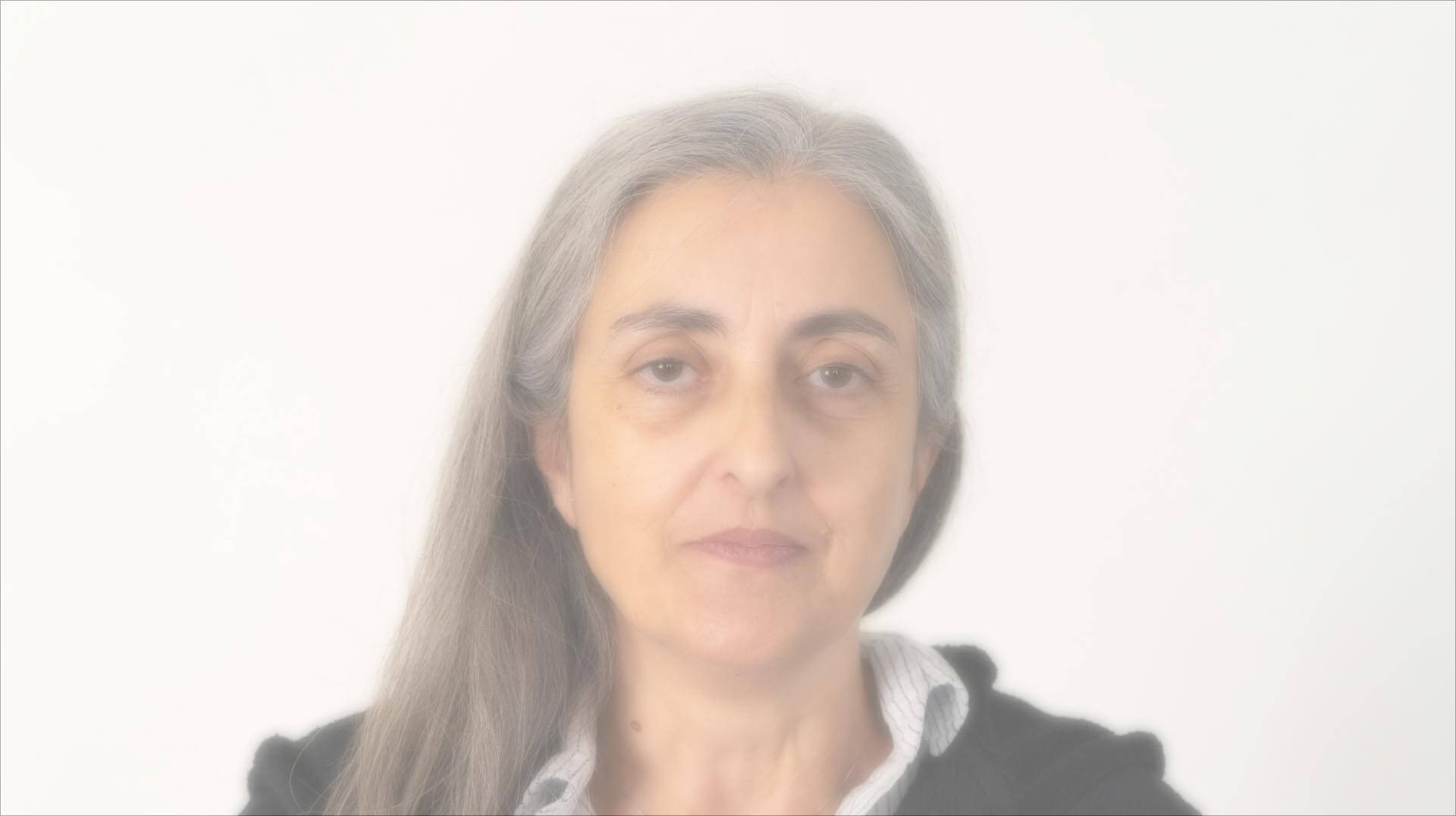Share Alice's story
Not having
a job is
my fault,
isn’t it?
Not having
a job is
my fault,
isn’t it?
At the house by the side of the road, the gate is deceptive. It says that they breed and train German Shepherds here, but it has been a long time since the 12 kennels were full, with a pair of dogs in each cage, when they needed two big containers of food, each half the size of a person, to feed all the animals.
Maria Carvalho, 57, lives here with her husband, on the top floor of her in-laws’ house, on the outskirts of the parish of Águas Santas, in Maia, North of Portugal.
At the end of the interview, the woman told me that my grey hair didn’t match my face, a young spirit. They liked my CV, they liked my conversation, they may even have liked me, but for a job behind the counter, that look didn’t work.
I even thought it was funny. It was an adventure.
I’d never died my hair;
I’d never even thought about it. But as work depended on it, OK. If they want me to wear a yellow shirt, I’ll wear one. If they want me to wear shorts, I’ll wear them too. If they want me to dye my hair, I’ll dye it. And I did.
It’s funny, leaving the hairdressers, looking in the mirror and thinking, “I look so different.” But, after I’d washed my hair, I couldn’t style it like the hairdresser had, with those little twists. And after a week or two, the grey hairs started to come back, it looked horrible. Constantly back and forth to the hairdressers... It’s a waste of time sitting there, just reading a magazine - I’m not interested in other people’s lives. So once, during the holidays, when I’d been working in the garden centre for five or six years, I got home and said, “I’m not dying my hair anymore!” And I shaved it off.
I was even mistaken for a man. And for a while, I was always changing it. I couldn’t find a hairstyle that I liked.

I had worked in customer-facing roles all my life.
It just happened that way. As an opportunity arose, it’d take it. In the first company, I worked on the machines, in a factory. It was an integrated circuit company, an electronics company. Then I worked in a private clinic in Porto. I’ve worked in estate agents – also on reception, never as a saleswoman - and in the Prelada Hospital, for a short while. I even set up a 99p shop, there were a lot around at the time.
But that didn’t work out. I muddled through, doing what I could, given my limited schooling, which even back then was limited...
Now it is considered even worse, isn’t it? Now year 12 (17-18 years) is the minimum, isn’t that right?
I don’t even have that.
I left in year 11.


It was always important to deal with things head on. As difficult as it might be, or however much we may want to insult the customer, we always have to do what the person paying our wages would do. And I was always good at that. I was never fired; it was always that the businesses closed. The only one that sent me packing was the last one, a large garden centre in Maia, in 2013.
Now, no one wants a 57-year-old woman as a receptionist.
A while ago now, my daughter told me that a café nearby was looking for people. She said that someone she was living with was unemployed, and the person in the café said to come in on such-and-such day, when the boss would be in.
I went on the specified day and the man looked me up and down.
– The boss didn’t come in. In the end, he didn’t come.
– The boss didn’t come in. In the end, he didn’t come.
Like someone saying, “We’re not interested”. There were only young girls working there, and I don’t fit, you know? I don’t have the right image, I’m not pretty enough, to serve customers.
Why?... because I think that there are lots of people who can do this better than someone of my age.
I don’t know... I don’t know. The young need to have opportunities. I see that through my daughters who studied, and only the middle one is working in the field she studied.
It doesn’t make much sense for young people to invest in their training and just for someone with more experience to come along and take the places they were working for, to get on the ladder.
Me, if I’m not doing anything, it’s my fault.
In some way, I failed in my professional development. I failed by not studying more. I failed by not training when I was younger, by not taking the time to train in a profession.
So, not having a job is my fault, isn’t it? It can’t be anyone else’s.
I left school bit by bit.
My father never allowed my mother to work. He was very protective of traditional family roles - he still is, although now he is bedridden and 91 years old, so now he isn’t in charge of anything. A woman should be in the home, looking after the children, the house, waiting for her husband to come home, with dinner ready. My father worked hard and earned a good wage, but there were six of us.

It was important for me to earn money.
I started courting and I had to be quick if I wanted to get married and have kids and the normal things of the time. I was 18 or 19 when I left school. I also signed up to night school to be able to work in the day, but it didn’t work out. It didn’t work out at all. I would get home tired; I didn’t feel like going to school.


I remember the first pay packet I got.
It was only for two weeks’ work and, at the time, it was around 30 contos (€149.64).
I felt like I had a lottery ticket in my pocket. I shared it with my mum - until I married, I always shared what I earned with her - and, even so, I felt very powerful. I was godmother to my niece and I would buy her the best things money could buy.
When we got married, we moved here, to my in-laws’ house. My mother-in-law lives below - she has never meddled in my life or anything, but I always wanted to have another house, to leave here. But we had a daughter, then another, and then another. And then paying for one to study, and then the other one and then the other one, and we just stayed.
That was now more important. I am more resigned to it and, now, without a job - I have a small job in some hotels doing washing up, but it’s not really a job, is it? - and at my age, I don’t think about that much. I’m good now.
Of the nearly 323,000 unemployed people in the third quarter of 2019, 124,000 (38%) were 45 or above. Source
I’m good now.
Alice laughs to lighten the tone whenever the conversation turns towards something serious.
She talks more, she talks faster. Like someone saying let’s get out of here.



I had dreams that haven’t come true, and won’t, you know? I’m over halfway through my life and now I’m not going to change anything.
Life, really, has passed me by.
But there is one thing that gets me riled: they don’t tell us about our rights. When I was made unemployed, I felt this a lot. If we have the right to exemptions from paying fees and charges, for example, why don’t they tell us? Why is it that they don’t tell us that we have the right to this, this and this?
Slowly, I have been fighting for these rights. I knew that I had the right to the minimum income. Social Security told me no, because my daughters, who were still living at home, earned enough to support me.
This is a Social Security benefit provided to citizens registered at the job centre who are considered to be living in conditions of extreme poverty. The calculation of these amounts varies according to the household. Source
Who is the State to force them to do this, and to force me to live off them?
Thank God, they were earning good wages - because they studied and I paid for them to study -, but I didn’t have to be depending on their work to do what I wanted to do.
Thank God, they were earning good wages - because they studied and I paid for them to study -, but I didn’t have to be depending on their work to do what I wanted to do.
I was unemployed lots of times, but I always tried to earn my own money - for my matches, as my grandma would say. I have always wanted to build my life paying my way.


I’d never thought about it, but, perhaps, I have a bit of my grandma in me. Me and my brothers and sisters - I have an older sister and two younger siblings - we lived with her for a few years when we were small.
School was a long way from home, so my mum sent us to live with her because it was really close.
My grandfather was a barber, he had his barber’s shop, but my grandma was always a fighter, very industrious. She made trousers, dresses, if it were necessary she would make cakes, savoury snacks, anything to not live off my grandad.
My mum always lived off my dad, right? But, my dad gave everything he earned to her and she handled it. With my grandma that wasn’t the case. She always had her own savings, set aside, for her things.
My grandad only gave her what was necessary for the house and the rest was his - as a man, it was his.
Today, the young who live in their parents’ houses, what do they need to work for? To feel independent, useful, right? It’s the same at my age.
Now, it’s my daughters or my husband who go and buy my clothes, my things now, because I don’t like spending money that’s not mine. Christmas, for me, doesn’t exist anymore.
Living off your children isn’t easy. It is not what one wishes for in life. But you keep living.
But you keep living.
Unemployment got me out of the habit of many things. At the beginning it was like being on holiday. But quickly the penny dropped.
I didn’t have much to do, my children were all finishing university. I was a bit lost - not psychologically, but I felt a bit alone.


I would get up late - the day had 24 hours and I would only make use of 12 or not even that. I would wander around. At the time, my parents spent more time in Viana than here.
So, I had no one.
“Idle minds are the Devil’s workshop”,
“Idle minds are the Devil’s workshop”, as my sister-in-law, who is Brazilian, says.
And it’s true, because if we don’t have anything to think about, we fixate on the bad. We never imagine, “Ah, now I don’t have anything to do, I’m going to imagine what the Sahara Desert or some other nice thing is like”.
No, the Devil comes and finds a way to mess with us.

Without work, I lost my sense of worth. I’m at home, now... Value the person who made your bed? But I never got sad, I never gave into this... As my mum says, depression is for the rich. We don’t have time for that.
But one thing I can’t stand are obligations. “Now, stay there.”
I won’t be forced to stay here or anywhere. Not even church. Like before when we were made to go to mass... Now I go when I want.
It was very embarrassing going to the council offices
to sign on every two weeks.
I would always be even more agitated than normal.
As of 1 October 2016, the unemployed are no longer required to sign on every fortnight at employment centres or council offices, which they were obliged to do to prove they were actively looking for work, to guarantee their receipt of unemployment benefit. Source
I had to go there to tell them that I was still unemployed, when everyone already knew. I had to look at the list of jobs: bricklayers, locksmiths and operators for machines I haven’t heard of... None of those jobs were for me.
In three years, I only saw two offers that fit.
They were already taken when I called. The others, there were running stitch seamstresses, and I don’t even know what that means... Lots of times, I would look at the papers and go over them, simply so the woman at the desk could see, but I already knew that there was nothing there for me.

As of 1 October 2016, the unemployed are no longer required to sign on every fortnight at employment centres or council offices, which they were obliged to do to prove they were actively looking for work, to guarantee their receipt of unemployment benefit. Source
– Have you had a look at the job adverts?
– Yes, yes.
Stamp. See you in two weeks.
Why? They are the obligations that those governing us have no understanding of. It’s the same as if you were in prison and you had this same obligation to say to the police, “I am here, I didn’t run away”.
It’s the same feeling, you know? I hadn’t wronged anyone and I hadn’t committed any crime. But now I am not a prisoner,
I don’t have to go - what do you call it?
To prove I exist.
I was only called after this. They once sent me a call for applications to go to Maia to go for a job.
I got there, a room with 30 other people and the woman started to explain that it was for an electricity company, in France, and that it was easy; that they would provide training and then they would pay for a trip twice a year to visit our family;
that accommodation was included. At the end, she said: “If you’re interested, write down your details here.”
I stayed there with the paper in my hands... I even thought about it for a moment. Shall I go to France? Learn how to install electricity meters?
It was the only time that they called me in the four and a half years I was receiving
unemployment benefits.
Anyone who has, involuntarily, ceased to have a paid work contract and is registered at an employment centre can receive the unemployment benefit from Social Security.
It pays 65% of the mean salary received in the year prior to entering unemployment, and can vary from €435.76 to €1089.40, for employees. There are specific rules for self-employed workers, one-man business owners, and directors and managers.
Source

At the time, I tried to go out, to do a lot of things.
I went to Ermesinde a lot, to the park with a book under my arm (That War and Peace?
It’s mine, I’ve read it more than once.) I couldn’t stay at home.
It’s a lot easier to manage your time if you’re doing something. If not, I sit down to scroll through Facebook and at some point I realise the day’s gone and I’ve done nothing. It’s the sensation of watching your life pass by, without leaving a mark on the world to be able to say:
“I was here.”



Now I am. I go to the Ermesinde Social Centre, to a project called the Feira Venda de Saberes (Flea Market).
I started going as soon as I became unemployed and it helped me a lot.
I learn, I switch on my brain, I occupy my mind with something beyond soap operas and those sorts of things, that I don’t like.
I like to make things. Not in the kitchen: that’s just put everything in a pot, follow recipes. I like when there are no rules.
I like to look at a rickety chair and give it a new lease of life. Just because the things are old or worn out doesn’t mean they are rubbish.


I started to get some hours through a temping agency. I started on 8 March, International Women’s Day.
On 7 March, my nephew, who went to open the Brasileira café, in Porto, called me to ask if I could go there on Friday and Saturday, because the pot washer was off sick.
– Auntie, don’t worry, there’s no cooking involved.
I went on Friday, Saturday, Sunday and Monday. Afterwards, they started to call me for other places and I never looked back. I didn’t go to any interview: I worked and that was it. I don’t know my employers, and they don’t know me. They didn’t judge me on my physical appearance, just on my work.
I don’t like the kitchen - to be shut up in a kitchen or a hairdresser’s would be one of the last things I would do in my life to earn money.
But everyone knows how to wash up.
I like having the freedom of working when I want. It is not exactly when I want, but to say, “Yes, I can work that day or not”.
If I have something else to do, I don’t go. I feel free. I earn what I want to earn.
And when work is done, I wash my hands and I come back fresh and light like before.
Even so, Alice considers herself unemployed. She talks about “when I was working” in the past. Because now she works, but it is not a job to her. She goes when she wants. And this freedom is priceless.
Now she wouldn’t change it for anything.
When we say, “to go to work”, with fixed working hours, I don’t have that anymore and I can organise my life better.
I have to organise the markets, where I can go if I want to leave the house. It’s one thing to leave the house to have a coffee, it’s another to go out and actually make something.
Obviously what I earn doesn’t pay all the bills, but it helps. The fact that now I don’t eat at a cost to my husband.
But I think that I am given fewer opportunities than other people. Because others are more visible.
But I think that I am given fewer opportunities than other people. Because others are more visible.

The State see refugees; when I was studying, it saw the returnees from the colonies and, after that, it saw the children of the returnees. But it doesn’t see the majority of people who are in need.
The number of people who are in unemployment is also not pretty. But if I go into training, I am no longer part of this number.
The status of unemployed is classified as not having a job and being immediately available for work. People who are without work and on special employment programmes or professional training are considered “occupied” and are not included in the unemployment rate calculation. People who are without work and, for health reasons are not fit to enter the workplace immediately are considered “temporarily unavailable” and are also excluded from the unemployment rate calculation. Source
So, the Government comes out saying that they have managed to lower unemployment by I don’t know how many per cent and we know it is false. It’s the Portuguese way, we stay silent and let them say whatever they want.
The status of unemployed is classified as not having a job and being immediately available for work. People who are without work and on special employment programmes or professional training are considered “occupied” and are not included in the unemployment rate calculation. People who are without work and, for health reasons are not fit to enter the workplace immediately are considered “temporarily unavailable” and are also excluded from the unemployment rate calculation. Source
I think that it’s worth fighting, but small struggles, ones that match my size. I am not going into a war where I need weapons I don’t have.

I never liked to draw attention to myself – ever since I was a child.
I never liked people to pay more attention to me than others.
I’ve always known my mind, but I’ve never imposed my ideas on others, you know? I was happy to go along with everything.
I didn’t even get the wedding dress I wanted.
I wanted a short one, without those frills- I didn’t have a veil or anything on my head. But my mum insisted so much, that a girl couldn’t go like that, that I thought... “To hell with it, what do I care.”
I prefer to not make a scene.
I make my way, I do what I have to do and I move on,
I don’t need thanks or medals.
What I have and what I have had is enough.
It’s enough.
It’s enough just to get by.

